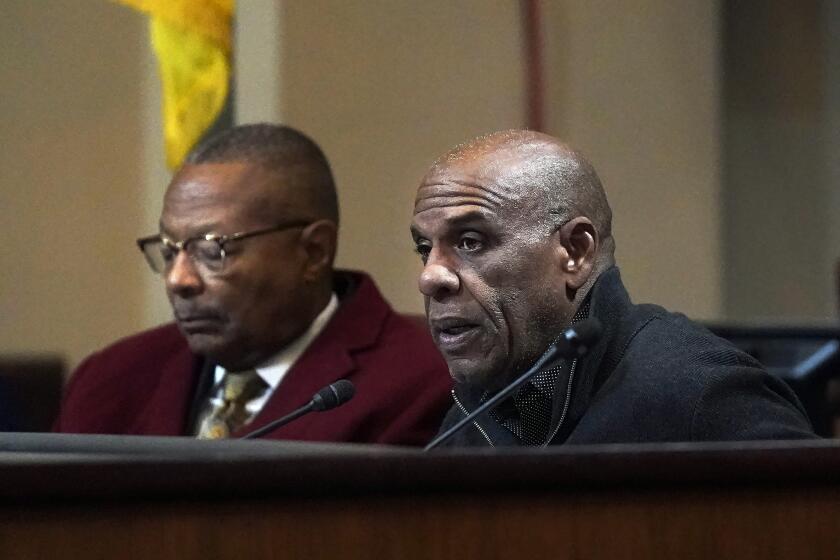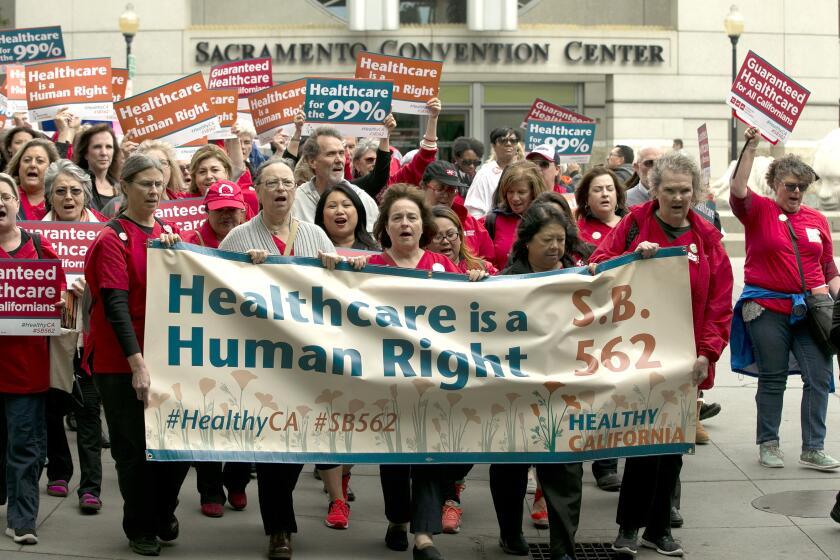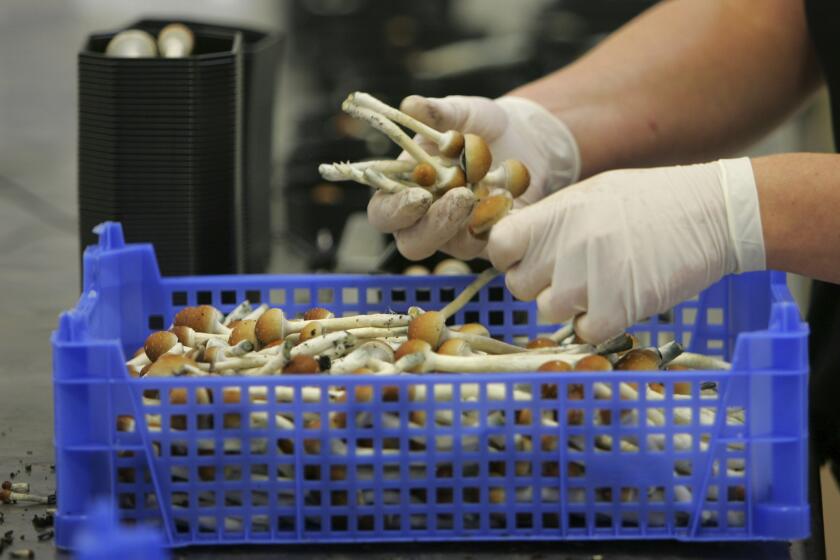Tribes Have Become Players in Sacramento
These are heady times for California’s Native Americans, who a decade ago had little more than aspirations. With their newfound wealth, and their willingness to spend it on candidates and campaigns, casino-rich tribes have never had more sway in state politics.
Their influence was on display during the just-completed 2003 legislative session, as tribal lobbyists pushed legislation intended to protect their sovereignty.
For the record:
12:00 a.m. Sept. 24, 2003 For The Record
Los Angeles Times Wednesday September 24, 2003 Home Edition Main News Part A Page 2 National Desk 1 inches; 39 words Type of Material: Correction
Tribal title -- An article in Saturday’s Section A about Indian tribes’ political influence in California misspelled Mark Nichols’ name as Nicholas, and incorrectly truncated his title. Nichols is chief executive officer of the Cabazon Band of Mission Indians.
And on the hustings, tribes are a dominant force. Since 1998, they have spent more than $120 million on California politics, the bulk of it on propositions to make gambling legal on Indian land.
In the recall campaign, five tribes have spent $6.6 million, making tribes the largest donors in the race. Most of that -- $5.1 million -- has gone to help Lt. Gov. Cruz Bustamante, an advocate of tribes’ right to govern their own affairs and the front-runner to replace Gov. Gray Davis if Davis is recalled.
Tribes have also begun to aid state Sen. Tom McClintock’s gubernatorial bid, donating $580,000 to help the Thousand Oaks Republican. A strong showing by McClintock could be a boon to Bustamante. Also an advocate of tribal sovereignty, McClintock could pull support away from Bustamante’s closest rival, Republican actor Arnold Schwarzenegger, who angered some Indian leaders by calling them “special interests.”
On Friday, three tribes spent more than $1.4 million to ship mailers and to air TV spots for Bustamante and McClintock.
The political largess has left some tribes sounding alarms that Native Americans, most of whom still live in poverty, may be seen as rich and self-sufficient.
“I think there will be a backlash” from the contributions of $500,000 to $2 million from single tribes, said Paula Lorenzo, chairwoman of the Rumsey Band of Wintun Indians. “Tribes will be perceived as the rich kids on the block, out there throwing dollars.”
Lorenzo called tribal donations to Bustamante a “gross amount of money.” “The money,” she said, “is going to work against us five years from now, 10 years from now.”
The Rumsey band has given one $25,000 check to Davis. But it could dole out seven-figure checks if it wished. The band was a pioneer in Indian gambling, opening a bingo hall 40 miles west of Sacramento in 1985. Next spring, the 46-member band will open a new casino featuring 2,000 slot machines, eight restaurants, a 200-room hotel and an 18-hole golf course.
Lorenzo worries that, in time, legislators will conclude that tribes have enough money and will declare: “We’re not giving the tribes anything more; they can afford it themselves.”
In far Northern California, 4,568 Yurok Indians live on a reservation that stretches 44 miles upstream from the mouth of the Klamath River. Three-fourths of the tribe’s members have no job. Phone and power lines do not reach much of the reservation. There is no casino on Yurok land; it’s too far from population centers.
Yurok Chairwoman Susan Marsten said she was pleased that some tribes can donate large sums to political campaigns. The money ensures access that once was only for wealthy individuals and major corporations, she said.
“There is a level playing field for the first time in history, and that is good,” Marsten said in a phone interview. “But people need to recognize ... there are huge disparities between the haves and have-nots.”
California has 107 federally recognized tribes -- more than any other state. Of those, 54 operate casinos. Fewer than 20 have casinos with the maximum 2,000 slot machines permitted by state law.
Of the wealthy tribes, a minority are major political players.
This year, seven tribes have donated $7.8 million to state and local campaigns, including the cash for Bustamante.
Two Southern California tribes, the Pechanga Band of Luiseno Indians and the Viejas Band of Kumeyaay Indians, have spent $4.5 million between them to help Bustamante’s gubernatorial effort.
By contrast, all labor unions combined had spent about $4.2 million on the recall through Friday.
“This is a proud contribution for the Viejas people,” said Bobby Barrett, a member of the Viejas tribal council.
“Cruz Bustamante is our friend; he understands sovereignty. He has been here. He has listened to our elders. He has sat with our kids. He has learned our stories and our values.”
Democrats, who hold most offices in Sacramento, receive a majority of tribal dollars.
The California Democratic Party and the state’s Senate and Assembly Democrats have received $586,000 this year from tribes, compared with $337,000 for the state GOP and Republican legislators.
Like all major donors, tribes have ready access to legislators. In the closing hours of the legislative session, one of the leaders of the Morongo band and her lobbyist were in the Assembly speaker’s quarters, making their case on pending measures.
Tribes also retain some of the most effective lobbyists in town. As their power has grown, they have blocked expansion attempts by other gambling enterprises, such as racetrack operators and card rooms. Racetracks, for example, covet slot machines -- and the tribes routinely have kept such efforts bottled up.
“With the kind of money they have, they can defeat anything they see as an incursion,” said John Van de Kamp, former California attorney general, a Democrat who now represents horse-racing interests.
When Van de Kamp left politics a decade ago, oil companies, the insurance industry, trial lawyers and a few other interests were major players.
Now, Native American tribes are among the most powerful forces in the Capitol.
“Everything else pales by comparison to what the Indians can put together,” Van de Kamp said.
Tribal lobbying on gambling measures attracts the most attention. But their lobbyists advocate for an array of other issues as well.
They have urged that more Native American history be taught in schools. Tribes with police forces have sought more law enforcement authority.
Measures unrelated to gambling that tribal lobbyists have pushed this year include:
*A bill by Assemblyman Lou Correa (D-Anaheim) that would give tribes the same right as state and local government to sell bonds to finance construction on their reservations and exempt bonds’ buyers from state taxes on interest payments. The Assembly approved the measure, AB 382, on a 76-0 vote, but it was held in the Senate and will likely be taken up again next year.
*Legislation signed by Davis this month that allows tribes to be reimbursed for providing health care on reservations. The Senate approved the bill, SB 308 by Sen. Liz Figueroa (D-Fremont), on a 39-0 vote; the Assembly vote was 74 to 1.
*Legislation that would give Indian tribes greater rights to be notified about, and to intervene in, adoptions and custody matters involving Native American children. The measure, SB 947 by Sen. Denise Ducheny (D-San Diego), awaits Davis’ signature. The Assembly approved it 79 to 0. The vote was 40 to 0 in the Senate.
Tribal lobbying is not always successful. The year’s highest profile legislation not related to gambling was SB 18, by Senate President Pro Tem John Burton (D-San Francisco). It would have given tribes some say over development at or near more than 500 sacred sites.
But in the face of opposition by the California Chamber of Commerce, utilities, oil companies, local governments and others, the measure failed.
At the same time, tribes won a major fight. Despite opposition from several counties, lawmakers approved a bill -- 34 to 0 in the Senate and 65 to 0 in the lower house -- giving tribes veto power over expenditures from two state funds they pay into from casino profits.
They are obliged to contribute about $130 million a year to one account to aid tribes without casinos and the other to ease their casinos’ effects on state and local government.
The latter fund contains about $25 million -- a “drop in the bucket,” said lobbyist DeAnn L. Baker of the California State Assn. of Counties. San Diego County alone places the price of improving roads to casinos in once-rural areas at $150 million.
Davis has not decided whether to sign the measure, SB 621 by Burton and Sen. Jim Battin (R-La Quinta).
In Sacramento, tribes jealously protect their sovereignty, a legal status that ensures they are exempt from taxes and most state laws and local ordinances.
To the dismay of many tribal leaders, Davis proposed earlier this year that they pay $680 million to the state in exchange for the privilege of casino expansion.
The Viejas band says there is sufficient demand to enlarge its casino beyond its current 250,000 square feet with 2,000 slot machines. On weekends, said tribal council member Barrett, “there is a waiting line at the freeway to get onto the property.”
The band wants to negotiate revisions to the current gambling pact with the governor, whoever that may be, but only “if the price is right.”
Barrett said the $680-million request shows Davis “doesn’t know what he is talking about.” The tribe could not afford its share of such a fee, he said.
Pechanga Chairman Mark Macarro said in an interview Friday that tribes should determine for themselves the number of slot machines in their casinos. “The demand of consumers should dictate,” he said.
Bustamante has criticized Davis’ fee proposal, saying he favors a suggestion by the Viejas band that it pay the equivalent of a corporate profits tax -- an amount that probably would allow tribes to pay less than the $130 million they pay now.
In his first year in office, Davis negotiated compacts governing casinos and helping to place on the 2000 ballot Proposition 1-A, the measure voters approved that guarantees tribes exclusive operation of Nevada-style casinos in California.
For that, some tribes remain loyal to the governor. The Cabazon Band of Mission Indians, for one, is planning a rally later this month to oppose the recall effort and support Bustamante on its reservation outside Palm Springs
“While some say Bustamante is going to win,” Cabazon chief Mark Nicholas said, “that does not mean you abandon someone who has been a good friend to Indian gaming.”
Still, there is anger at the Democratic incumbent.
Early in his tenure, Davis sided with a partnership that wanted to open a dump in Gregory Canyon in north San Diego County, near a mountain held sacred by tribes. Backers of the dump contended that tribes opposed it because their casinos were nearby and they were worried that business would suffer.
The partnership later donated $100,000 to a Davis-sponsored initiative. The Pechanga band, operators of a large casino near Temecula, helped lead opposition to the dump.
The band has given Bustamante $500,000 in the recall campaign, and placed $2 million in an independent campaign committee that is also helping the lieutenant governor.
Bustamante was a friend to the Pechanga “before we had gaming, before Pechanga was an economic entity of any sort,” Macarro said. “Loyalty begets loyalty in politics.”
“What the tribes are looking for is a governor who is going to show respect and treat tribes the way they should be treated,” said Vincent Armenta, chairman of Santa Ynez Band of Mission Indians, which has remained on the sidelines in the campaign.
“I can tell you, Gov. Davis has no respect for tribal sovereignty that I’ve seen.”
Other tribes that have a stake in the outcome haven’t spent directly on the recall race.
But that could change, as the Agua Caliente Band of Cahuilla Indians suggested in an ad in The Times last week. The Agua Caliente own casinos in downtown Palm Springs and off Interstate 10, and hope to expand.
In the ad, the tribe says its “continued prosperity depends on the successful completion of a new and fair operating agreement” with the state.
The ad called on Bustamante, McClintock, Schwarzenegger and non-partisan candidate Arianna Huffington to state their positions on a revised gambling compact.
*
(BEGIN TEXT OF INFOBOX)
Tribal transactions
A handful of California’s 107 Indian tribes have become the largest donors to this year’s recall race, giving more than $6 million directly to candidates and to independent campaigns on their behalf.
*
Five tribes that have given the most
Pechanga: $2,538,200
Viejas: $2,017,848
Sycuan: $979,900
Morongo: $553,729
Santa Rosa: $501,000
*
Where the dollars have been targeted
Bustamante: $5,149,500
Davis: $396,200
Schwarzenegger: $0
McClintock: $580,000
Source: California secretary of state
*
Times staff writers Jeffrey L. Rabin and Glenn F. Bunting contributed to this report.
More to Read
Start your day right
Sign up for Essential California for news, features and recommendations from the L.A. Times and beyond in your inbox six days a week.
You may occasionally receive promotional content from the Los Angeles Times.






